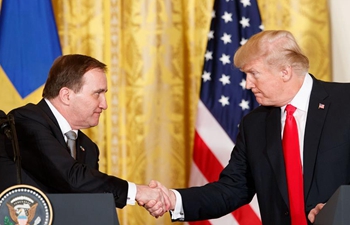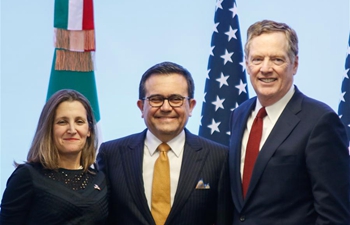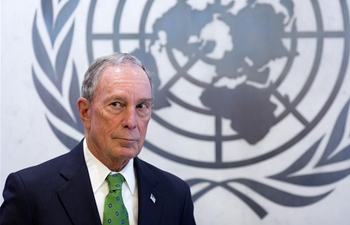by Evan Duggan
VANCOUVER, March 9 (Xinhua) -- The U.S. tariffs on imported steel and aluminum announced Thursday would benefit Canada temporarily but almost surely draw retaliatory measures from producers everywhere else, Canadian trade experts have said.
U.S. President Donald Trump signed two proclamations Thursday in Washington to implement a 25-percent levy on steel imports and a 10-percent charge on aluminum, doubling down his efforts against what he said were cheap imports hurting American industries.
However, the president exempted Canada and Mexico from the tariffs as the three North American nations continue their contentious renegotiations of the 24-year-old North American Free Trade Agreement (NAFTA).
Trump said other nations could also win exemptions as long as "their products no longer threaten our security." The tariffs will take effect in 15 days.
Commenting on the U.S. policy, Canadian experts said while the temporary exemption granted to Canada will render Canadian-made steel and aluminum products a lower-price advantage, it is also a clear bargaining tool for Trump to pressure Canada in the ongoing NAFTA talks.
"Because other countries are subjected to these tariffs, it should actually increase demand for steel and aluminum from Canada," said James Brander, a trade expert at the University of British Columbia (UBC) in Vancouver, Canada.
"Trump is using this (as) a tactic to try to put more pressure on Canada and Mexico to go along with some of the things the U.S. wants in the NAFTA negotiations," he added. "If it doesn't work, they will be included in the tariffs."
According to the Canadian Steel Producers Association (CSPA), Canada and the United States "evenly" traded 12 billion Canadian dollars (8.5 billion U.S.dollars) worth of steel in 2017.
The association said Canada is the top destination for U.S. steel exports, representing half of all its total exports. And the United States is the number one destination of Canadian steel exports.
"Trump is basically thumbing his nose at the rest of the world," Brander said. "That is of concern obviously everywhere."
"I think everybody else really doesn't want a trade war with the U.S., and they don't want a sharp decline in international trade," he said, predicting that the countries affected will make efforts to de-escalate the trade disputes.
John Ries, another trade expert at UBC, said the tariffs will affect about 25 percent of steel and aluminum products entering the U.S. market, according to his own calculations.
He said that in the long term, countries that have been slapped with the tariffs will likely seek recourse through the World Trade Organization, which he expected to rule against the United States.
"The U.S. would be in the position of having to eliminate the tariffs, or they could ignore the WTO ruling," Ries said.
Discarding certain WTO rulings viewed by Washington as infringing on U.S. sovereignty was exactly what the Trump White House proposed in a new trade approach sent to the U.S. Congress on Feb. 28, breaking away from its long-time commitment to the global trade regulatory body.
Ries predicted a worst-case scenario where the affected countries also bypass the WTO and take retaliatory measures outside the global free trade framework.
"Then it gets a little scarier because then we don't have a framework for maintaining fair and open trade," he said.













